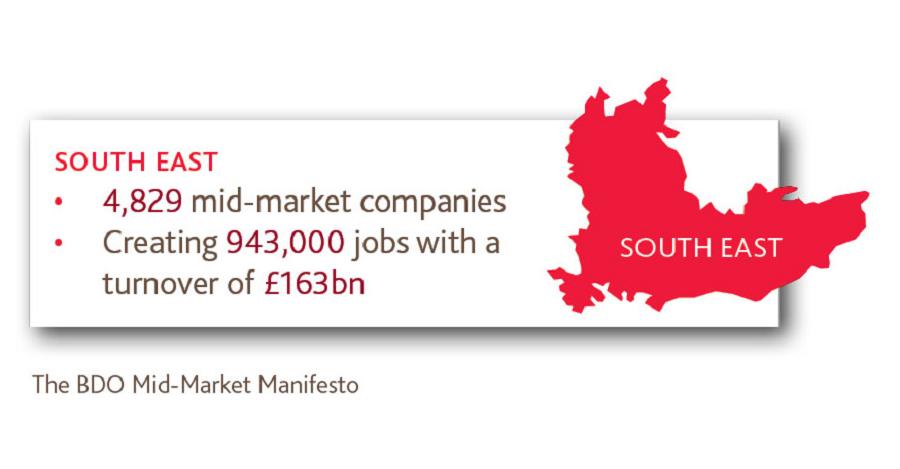Despite their fundamental importance to the economy, mid-sized firms in the South East are under-valued and over-looked, according to accountancy and advisory firm BDO LLP.
New economic research, published by BDO, reveals that despite accounting for less than 1% of all firms in the South East, mid-market companies create 27% (943,000) of private sector jobs in the region.
The 4,829 mid-sized companies in the South East, all of which have a turnover between £10m-£300m, also contribute £163.3 billion in revenue and £50.9 billion GVA every year.
But, according to BDO, the mid-market is caught in a ‘policy and profile’ black hole: too large to benefit from policies tailored to small business, but too small to win the attention that the largest corporates and FTSE firms command from the media and policymakers.
Alongside the new data highlighting the impact of the mid-market, BDO has published its own Mid-Market Manifesto – a set of policies that could unlock the potential of the mid-market, adding over £1.3 billion to mid-sized companies’ revenues and creating thousands of jobs across the UK. The policies would benefit all businesses, but address particular areas of concern for the mid-market.
David Eagle, partner at BDO in the South East, said:
“Without a shadow of a doubt the South East’s mid-market is under-valued and too often over-looked. Mid-sized firms contribute a remarkable amount to GDP and jobs, and what’s exciting is that with the right support these businesses have the potential to deliver even more for our regional economy.
“The Government has done a good job at promoting the general needs of business but more can be done to help mid-sized firms specifically. As we begin the run-in to a general election, this is a good opportunity to reflect on the needs of this section of our economy, as all political parties consider what they can do to drive economic growth.”
The practical policy recommendations in BDO’s Mid-Market Manifesto address a range of areas from procurement, tax and exporting to retail, manufacturing and education and skills. They are designed to create the right conditions for growth.
David Eagle continued: “Our policy recommendations are rooted in reality and quantify just how beneficial to businesses, job creation, and the wider economy they could be. Straightforward changes even to policy around procurement could make a material difference.
“There is now a unique opportunity to tilt the balance in the direction of growth for the unsung heroes of our economy to ensure we drive value for South East plc.”
Some of BDO’s specific policy recommendations include:
• Temporarily reducing employers’ National Insurance for manufacturing companies
Make tax simpler and fairer and encourage mid-sized business to export by temporarily cutting National Insurance (NI) for manufacturers. This would boost UK GDP by over £3.5 billion (£1 billion from the mid-market) and create nearly 90,000 new jobs.
• Awarding government contracts on the basis of the employment and training benefits to the supply chain, not cost alone
Support British business by changing the way the government awards contracts toensure the best value to the economy, rather than looking for the cheapest price. This would increase UK GDP by £1 billion (£284 million from the mid-market) and create over 11,000 jobs.
• Allowing the Regional Growth Fund to lend to smaller businesses
Make it easier for ambitious mid-market firms to access the Regional Growth Fund to aid expansion. This would grow UK GDP by nearly £200 million (nearly £60 million from the mid-market) and create over 2,000 jobs.
Britain’s mid-market companies account for just 1% of all UK firms but generate a third of private sector revenue, totalling more than £1 trillion per year, and employ over 6.2 million people (one in four of all private sector jobs).






















